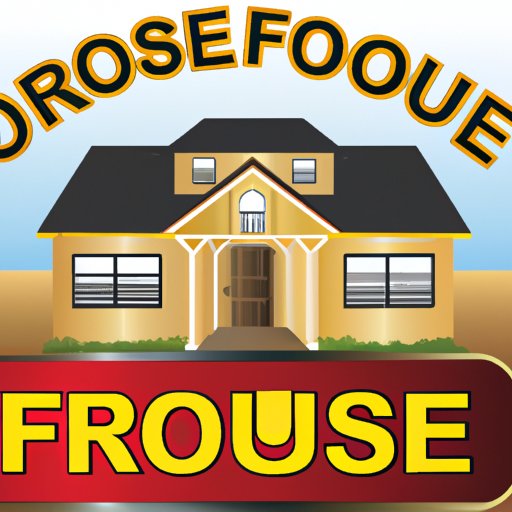Introduction
Foreclosure is a legal process that allows a lender to take ownership of a borrower’s property if they fail to make their mortgage payments. When a homeowner defaults on their loan, the lender can begin the foreclosure process. Understanding how foreclosure works is essential for homeowners facing this situation.
Explaining the Foreclosure Process Step by Step
The foreclosure process begins with the pre-foreclosure period. During this time, the lender will contact the borrower to negotiate repayment plans or other arrangements. If the borrower fails to respond or make arrangements, the lender will proceed with the foreclosure process.
Once the pre-foreclosure period has ended, the lender will issue a Notice of Default. This document informs the borrower that they are in default on their loan and have a certain amount of time to pay the balance or face foreclosure. The lender must also provide the borrower with a written notice of the right to reinstate the loan and the consequences of not doing so.
After the Notice of Default has been issued, the lender will then issue a Notice of Sale. This document states that the property will be sold at a public auction to the highest bidder. The lender must give the borrower a minimum of 21 days’ notice before the sale date.
Once the auction is complete, the lender will then file for eviction if the borrower does not vacate the property. The foreclosure process can take anywhere from two to twelve months depending on state laws and the lender’s policies.

A Guide to Avoiding Foreclosure
Homeowners facing foreclosure should understand their rights and take proactive steps to avoid the process. Working with your lender is the best way to avoid foreclosure. Lenders may offer payment plans, refinancing or loan modifications to help borrowers stay in their homes.
It is also important to seek government assistance if needed. Programs such as the Home Affordable Modification Program (HAMP) can help struggling homeowners avoid foreclosure. Other options include short sales, deed-in-lieu of foreclosure, and forbearance agreements.

Common Causes of Home Foreclosure
Financial hardship is the most common cause of home foreclosure. Unexpected medical bills, job loss, and unaffordable mortgage payments can all lead to foreclosure. Death or disability can also lead to foreclosure if the homeowner is unable to keep up with their mortgage payments.
Job loss is another common cause of foreclosure. If a homeowner loses their job, they may not be able to afford their mortgage payments. In some cases, lenders may offer a forbearance agreement to give borrowers more time to find a new job or make up the payments.
How to Handle a Foreclosure Notice
If you receive a foreclosure notice, the most important thing to do is respond immediately. Contact your lender to discuss your options and explain your financial situation. Consider all of your options, from refinancing to filing for bankruptcy.
It is also important to seek professional advice. An experienced lawyer or counselor can help you understand your rights and determine the best course of action. They can also advise you on negotiating with your lender and filing for bankruptcy, if necessary.

Understanding Your Rights During Foreclosure
Homeowners facing foreclosure have certain rights that they should be aware of. These rights include the right to receive notice of the foreclosure, the right to stay in the home until the foreclosure sale, the right to pay off the debt before the sale, and the right to challenge the foreclosure.
It is important to understand these rights and use them to your advantage during the foreclosure process. An experienced lawyer can help you understand and assert your rights during foreclosure.
The Pros and Cons of Foreclosing on a Property
Foreclosing on a property can be a difficult decision for any homeowner. There are both pros and cons to consider when deciding whether or not to proceed with foreclosure. On the one hand, foreclosure can be an effective way to get out of a bad loan or stop a foreclosure auction. On the other hand, foreclosure can have serious financial and emotional consequences.
It is important to weigh the pros and cons before making a decision. Consulting with an experienced lawyer or counselor can help you make an informed decision about whether or not to proceed with foreclosure.
Strategies for Surviving Foreclosure
Foreclosure can be a difficult and stressful experience. Fortunately, there are several strategies homeowners can use to survive foreclosure. Selling your home is one option, as is renting it out or negotiating with your lender. Filing for bankruptcy may also be an option, depending on your financial situation.
Surviving foreclosure requires careful planning and a thorough understanding of the process. Seeking professional advice from an experienced lawyer or counselor can help you navigate the foreclosure process and develop a strategy for surviving it.
Conclusion
Foreclosure is a difficult process that can have serious financial and emotional consequences. Understanding how foreclosure works and knowing your rights can help you avoid foreclosure or survive it if it occurs. Developing a strategy and working with your lender or a professional can help you navigate the foreclosure process.
(Note: Is this article not meeting your expectations? Do you have knowledge or insights to share? Unlock new opportunities and expand your reach by joining our authors team. Click Registration to join us and share your expertise with our readers.)
